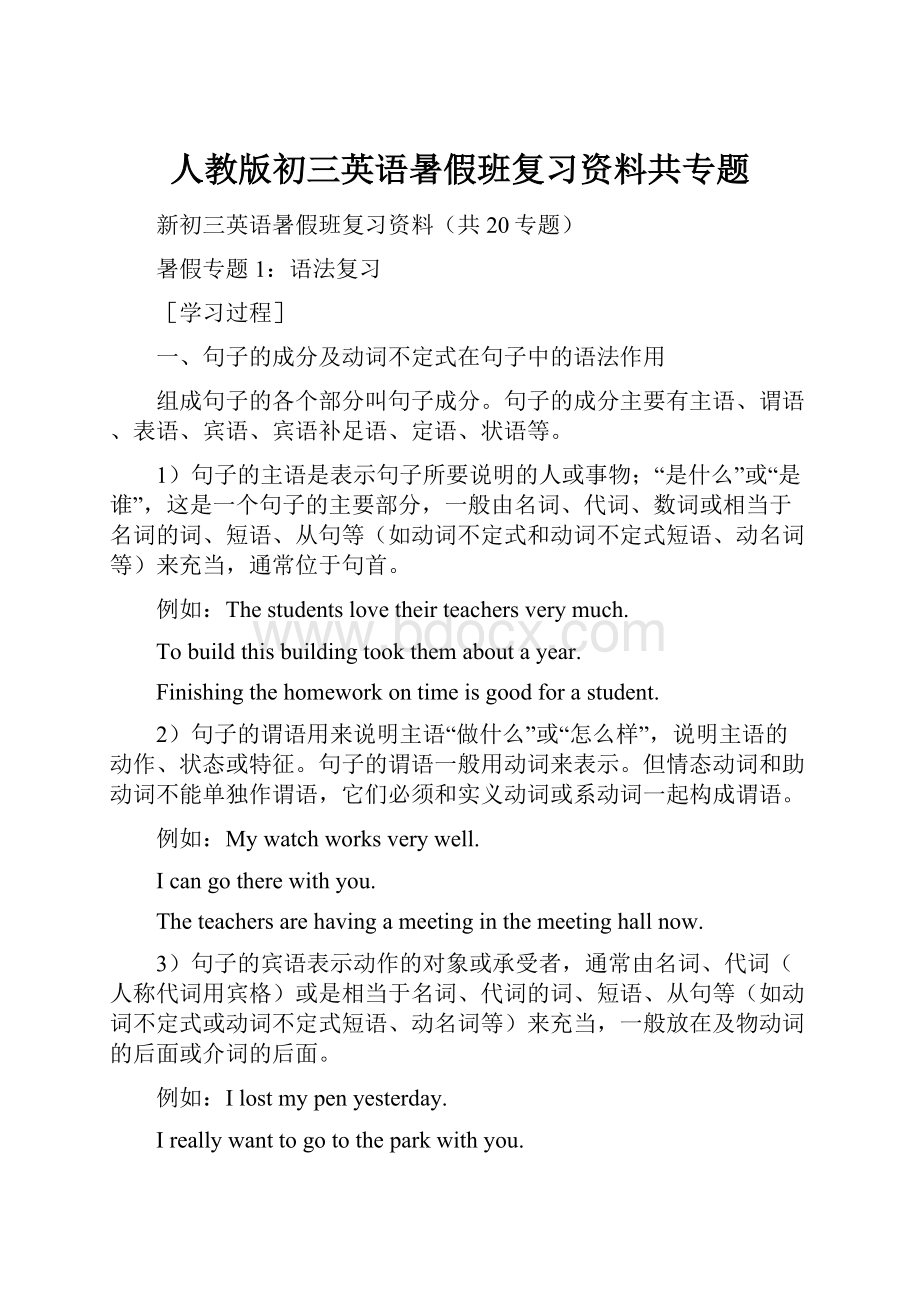人教版初三英语暑假班复习资料共专题.docx
《人教版初三英语暑假班复习资料共专题.docx》由会员分享,可在线阅读,更多相关《人教版初三英语暑假班复习资料共专题.docx(203页珍藏版)》请在冰豆网上搜索。

人教版初三英语暑假班复习资料共专题
新初三英语暑假班复习资料(共20专题)
暑假专题1:
语法复习
[学习过程]
一、句子的成分及动词不定式在句子中的语法作用
组成句子的各个部分叫句子成分。
句子的成分主要有主语、谓语、表语、宾语、宾语补足语、定语、状语等。
1)句子的主语是表示句子所要说明的人或事物;“是什么”或“是谁”,这是一个句子的主要部分,一般由名词、代词、数词或相当于名词的词、短语、从句等(如动词不定式和动词不定式短语、动名词等)来充当,通常位于句首。
例如:
Thestudentslovetheirteachersverymuch.
Tobuildthisbuildingtookthemaboutayear.
Finishingthehomeworkontimeisgoodforastudent.
2)句子的谓语用来说明主语“做什么”或“怎么样”,说明主语的动作、状态或特征。
句子的谓语一般用动词来表示。
但情态动词和助动词不能单独作谓语,它们必须和实义动词或系动词一起构成谓语。
例如:
Mywatchworksverywell.
Icangotherewithyou.
Theteachersarehavingameetinginthemeetinghallnow.
3)句子的宾语表示动作的对象或承受者,通常由名词、代词(人称代词用宾格)或是相当于名词、代词的词、短语、从句等(如动词不定式或动词不定式短语、动名词等)来充当,一般放在及物动词的后面或介词的后面。
例如:
Ilostmypenyesterday.
Ireallywanttogototheparkwithyou.
ShedecidedtobuyacupofCokeandapieceofbread.
MissSunsaidthatIhadtohandinthecopytomorrow.
有些动词后面有两个宾语,我们称这为“双宾”,这类动词主要有give,send,tell,write,post,pass,teach,wish等。
例如:
Iwillsendhimaletterthisafternoon.
Givemeapieceofpaper,please.
注意:
有些接“双宾”的动词后面用介词for
4)句子的表语用来说明主语的性质、特征、身份等,表明主语“是什么”或“怎么样”,可由名词、形容词、介词、动名词、不定式或从句等充当,它们与前面的系动词(如am,is,are,was,were,become,get,smell,turn,seem,sound,taste,feel等)一起构成谓语,形成“系表结构”。
例如:
Iamateacher.
Ifeelmuchbetterthanbefore.
Thepencilsareinmyschoolbag.
5)宾语补足语是用来补充说明宾语“怎么样”或“做什么”。
宾语补足语可以由形容词、动词不定式、名词、副词、现在分词等充当。
例如:
Heaskedmetostandup.
Weshouldkeeptheroomclean.
Iheardhersingingat9:
00lastnight.
Ikeepmyhandsbehindmyback.
6)句子的定语用来修饰名词或代词。
形容词、代词、形容词性物主代词、数词、名词、不定式、现在分词、介词短语、从句等均可作定语。
例如:
Ihaveablackcat.
Themanoverthereismyfather.
Mycatiswhiteandyoursisblack.
Ihavenohomeworktodo.
Peoplelivingthereareveryfriendly.
注意:
当形容词修饰不定代词something,anything,everything,nothing作定语时,要放在不定代词的后面。
7)句子的状语用来修饰动词、形容词或副词,表示动作发生的时间、地点、目的、方式、原因、程度、方式等,通常由副词、介词、介词短语动词、动词不定式以及从句来充当。
例如:
WangFangwasdoingherhomeworkcarefully.
Heranthefastestinthefirstgroup.
Icomeheretolearnplayingthepiano.
二、动词不定式在句子中的语法作用
由于动词不定式或动词不定式短语具有名词、动词、形容词的特征,所以它在句中可以作主语、表语、宾语、宾补、定语、状语等句子成分。
1.动词不定式做主语,表示句子说的是什么(指具体动作)。
例:
Toanswertheteacher’squestionsisverydifficult.
Todomyhomeworkoftentakesmeabouttwohourseveryday.
由于动词不定式或动词不定式短语做主语放在句首太长,有头重脚轻之嫌,所以常常用人称代词it来代替它作主语,称为形式主语,而真正的主语(动词不定式或动词不定式短语)被放在句尾。
例:
Itoftentakesmeabouttwohourstodomyhomeworkeveryday.
Itisgoodforustodomorningexerciseseveryday.
于是就出现了初中两个重要句型“ittakessb.timetodosth.”“itis+形容词+(for/ofsb.)todosth.”
例:
Ittakesmehalfanhourtocometoschool.
2.动词不定式作表语用于“主系表”结构中
例:
Toseeistobelieve.眼见为实。
3.动词不定式作宾语。
有些动词或动词词组常用不定式作宾语,常见的有agree,ask,choose,decide,hope,want,wish,wouldlike等。
例:
Sheaskedtogothereherself.
Iagreedtogotherewithher.
4.动词不定式作宾语补足语
动词不定式作宾语补足语补充说明宾语怎么样,用动词不定式作宾语补足语的动词有以下两种情况,一种是用带to的动词不定式作宾语补足语的动词,另一种是用不带to的动词不定式作宾语补足语的动词。
(1)常见的能用带to的不定式作宾语补足语的动词或动词短语有tell,want,ask,teach,like,allow,wouldlike…,expect,invite,love,prefer,waitfor等。
动词不定式作宾语补足语的否定形式是在不定式符号to的前面加否定词not。
(2)有些动词要求用不带to的动词不定式作其宾语补足语。
这些动词主要是一些表示感官的动词和使役动词,在初中阶段这类动词主要有以下几个:
一感:
fell
二听:
hear,listento
三让:
let,make,have
四看:
see,watch,notice,observe
半帮助:
help
5.动词不定式作定语。
动词不定式作定语时常放在被修饰的词后面,作后置定语。
例:
Canyoutellmethewaytogotothenearestpostoffice?
Doyouhaveanythingtosayforyourself?
6.动词不定式作各种状语
(1)动词不定式作目的状语,常用的结构是“inordertodosth.”。
例:
Weuseknivestocutthings.
(2)动词不定式作结果状语,常用于“too+形容词或副词+todosth.”和“形容词或副词+enough+todosth.”结构中,分别表示“太……而不能做……”和“足够……来做……了”。
例:
Mymotheristootiredtocookforus.
Yourquestionisdifficultenoughtoanswer.
7.“疑问词+不定式”的结构在句子中可以做主语、表语、宾语等。
例:
Whentostartbecameabigproblem.
Canyoutellmehowtogotothepostoffice?
【模拟试题】(答题时间:
30分钟)
选择填空:
()1.I’veneverseenfilmbefore.
A.soagood.B.suchagood.C.such.D.quitegood.
()2.JimShanghaitwicebefore.
A.hasbeentoB.hasbeeninC.hasgonetoD.hasbeen
()3.Hehastofinishtheproject,he?
A.hasn’tB.doesn’tC.hasD.does
()4.Theyhaveneverlearnedtoskate.we.
A.SohaveB.SodoC.NeitherhaveD.Neitherdo
()5.Ihardlyknewanythingaboutityoutoldme.
A.sinceB.afterC.untilD.when
()6.Theycouldn’tseehimthenwesawhim.
A.andB.soC.butD.or
()7.Theyaretalkingaboutwayselectricity.
A.saveB.tosaveC.savedD.aresaving
()8.Ihaveboughtacar.
Howlonghaveyouit?
A.boughtB.keptC.hadD.have
()9.Theyallwillvisittheiroldteachersinthefuture.
A.sometimeB.sometimeC.sometimesD.sometimes
()10.weatherwehavenow!
A.WhatafineB.WhatfineC.HowfineD.Howafine
()11.Studyhardfromnowon,you’llfallbehindothers.
A.andB.soC.butD.or
()12.LilyLucycangowithyou.Becausetheymustlookaftertheirsickmotherathome.
A.NeitherorallB.Neithernorboth
C.NeithernortooD.Notonlybutalsoboth
()13.SorryIforgotmybook.Iitathomethismorning.
A.tobring,forgotB.tobring,forgetC.bringing,leftD.tobring,left
完形填空:
Lifeteachesustolive.Tolive,youhavetoexist.Toexist,youshouldhaveapassporttothislivingworld.___1___toyourparents,who___2___youintothisworld.
Parentshavetakencareofusandsatisfied(满足)allourneeds.Theyhelp___3___wearehungry,afraidorill.Theyarealwaystherebyyou,nomatterwhenyouneedthem.Youalwayshopethattheywillbethereforyouandneverthinkofhowyourlifewillbe___4___them.Butasyougrowup,agealso___5___yourparentsandtheyneedyourhelpandsupport.
Manisachildat___6___,afterwhichhereacheshisyouth.Afteryouthheagain___7___throughthesecondphase(阶段)ofchildhood,also___8___asoldage.Thisisthephasewhereeveryoneneedsafeelingofbelongingand___9___takencareof.Wouldn’tweallexpect___10___feelingofsecuritywhenwegrowold?
Evenourparentsareexpectingustolookafterthemastheygrowold,butthey___11___tellusaboutthatclearly.
Someofusdon’tunderstandourparentsandaren’tgivingthemwhattheyneed___12___.Infact,nomatterwhatparentsdo___13___say,theyjustshowloveforus.Theyhopetoseeussucceedineverything.Soitisourdutytotakegoodcareofthem.It’sourpay___14___time.Let’sgivethefeelingof___15___,careandlovetoourparentsintheiroldage.Let’skeepinmindthattobeamanager,scientistorartist,wefirsthavetobeason.
()1.A.ThanksB.ThinksC.Thank
()2.A.broughtB.tookC.carried
()3.A.wheneverB.howeverC.whatever
()4.A.withB.withoutC.to
()5.A.catchesupwithB.fallsbehindC.leavesbehind
()6.A.firstB.lastC.next
()7.A.goB.wentC.goes
()8.A.callB.calledC.calling
()9.A.beingB.beC.become
()10.A.sameB.thesameC.different
()11.A.alwaysB.sometimesC.never
()12.A.muchB.moreC.most
()13.A.andB.butC.or
()14.A.frontB.backC.away
()15.A.safeB.safetyC.safely
阅读理解:
Doyouwanttosavemoneywhenyoutravelbytrain?
Herearesomeways:
DayReturns
Thiskindofticketcansaveyou45%onthefare(moneyfortickets).Youhavetotravelbefore8:
30a.m.andafter6:
00p.m.fromMondaytoFriday,butyoucantravelatanytimeonSaturdayorSunday.
BigCitySavers(Savers优惠票)
Youcansavemuchmoneywithticketsonsometrains.Youhavetobuythematthelatestby16:
00thedaybeforeyoutravel.
WeekendReturns
YoucanuseWeekendReturnsformostjourneysover60miles.GoonFriday,SaturdayorSunday,andreturnthesameweekendonSaturdayorSundayandyoucansave35%onthefare.
MonthlyReturns
Youcanusetheseticketsformostjourneysover65miles.Goanydayandreturnwithinamonth.MonthlyReturnscansaveyou25%onthefare
FamilyReturns
YoucangetacardofFamilyReturnsfor$20andthenwhenyoubuyticketslater,youneedtopayonly$3foreachoftheotherfamilymembers(4atmost).Youcantravelasoftenasyoulikewithintwomonths.
1.Whichkindofticketareyougoingtochooseifyouwanttogotoasmalltown75milesawayforfourdays?
A.DayReturnsB.MonthlyReturnsC.WeekendReturns
2.Ifamanbuyshimselfaticketof$15andthreeticketsforhisfamilywithacardofFamilyReturns.Howmuchwillhepay?
A.$47B.$27C.$24
3.Whichofthefollowingisnottrue?
A.AcardofFamilyReturnscanonlybeusedfortwomonths
B.IfyouwanttotraveltoLondonbyair,youcanuseBigCitySavers
C.IfyouleavethisFridayandreturnSaturday,youcanuseWeekendReturns
4.Thepassageisprobablytakenfroma_______
A.dictionaryB.textbookC.newspaper
【试题答案】
选择填空:
1~5BABCC6~10CBBBB11~13DBD
完形填空:
1~5AAABA6~10ACBAB11~15CCCBB
阅读理解:
1~4BCBC
暑假专题2:
名词复习
(一)知识概要
名词的概念在不同的语法教课书中有不同的解释和分类方法,但就实际应用来讲还是不要过分地追求其理论概念,而更多的要把注意力放在其应用上来。
我们不妨把它分为两大类:
专有名词与普通名词。
顾名思义,专有名词是指:
个人、事物、机关等所专有的名称,如,theGreatWall,America…它们是不能随意变动的。
而普通名词中则包括个体名词,如pen,worker…它表示单一的个体人或事物;集体名词,如:
family,class,team,它表示的是由若干个个体组成的集合体;物质名词,如:
water,paper…它表示的是一种物质,原材料;而后一种是抽象名词,如:
work,time…它表示着一种在实际生活中看不见、摸不到,但却与实际生活紧密相关的某些动作、状态、品质的抽象概念。
名词种类
专有名词
London,John,theCommunistPartyofChina
普通名词类名词nurse,boy,worker,pencil,dog,table
集体名词class,family,army,police,team,people
物质名词water,steel,glass,cotton,wood,sand
抽象名词happiness,love,work,life,courage,honest
功用
主语MyfamilyisnowinNewYork.
表语Hisfatherisascientist.
宾语Weloveourgreatmotherland.
宾语补足语HemadeLondonthebaseforhiswork.
定语Thegirlsaremakingpaperflowesrs.
状语Thecarcosthim1000dollars.
同位语MrBrown,afamousscientist,willcomehere.
(二)名词的数
名词在使用中的难点在于名词的数,即可数名词与不可数名词的实际应用。
不可数名词不能用数字计算,所以它通常只有单数形式。
它包含有专有名词、物质名词、抽象名词等,如:
English,air,water,cotton,work…可数名词是可以用数